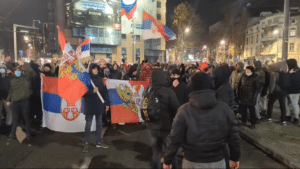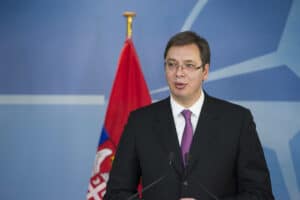On the 5th of April the Assembly of Kosovo passed a resolutionthat established a committee to investigate the controversial deportation of six Turkish nationals. Five teachers and one doctor were arrested and deported to Turkey after an operation by Kosovan security forces in close cooperation with the Turkish National Intelligence Organization. The Turkish nationals are allegedly part of,what Turkey calls, the ‘’Gulenist Terror Organisation’’ (FETO). Prime Minister Ramush Haradinaj denies any involvement in the arrests and fired his minister of interior Flamur Sefaj. The deportations have led to a wave of domestic and international criticism. The arrests followed after a week of tensions with Serbia as result of the arrests of a Serbian government official in Kosovo.
Gülenist purge
The six Turkish nationals worked for the Gulistan Educational Institutions, which operate four schools in Kosovo. Haradinaj reacted at first that the people were arrested because they didn’t have legal residence in Kosovo. However, Kosovo’s Ministry of Internal Affairs stated that it had arrested the six people based on national security reasons and deported them immediately to Turkey.
The vague statements and the move itself were criticized by Kadri Veseli, the speaker of parliament and leader of ruling the Democratic Party of Kosovo (PDK). “As a democratic state, Kosovo must institutionally address the legal responsibility of the actors involved in this case. The flagrant arrest of foreign nationals on groundless suspicions does not correspond to the European values that Kosovo should represent.” After growing criticism, Haradinaj stated that he didn’t had any involvement in the arrests. Subsequently he fired the Minister of Internal Affairs and the director of the Intelligence Agency. His dismissal requires the signature of President Hashim Thaci, who is yet to sign.
The deportation of the alleged Gulenists followed a comparable case last year. In October 2017 police forces detained a Turkish teacher for alleged contacts with Fetullah Gulen. The request for his extradition was suspended in December 2017 after a court ruled against, citing lack of evidence. Turkish officials continued to put pressure on Kosovo to arrests suspected Gulenists. As one of its main allies, Turkey and Kosovo have a close relation. Turkey was one of the first countries to recognize the country and invests billions of dollars in the country.
Shaken government
The sacking of the Interior Minister Flamur Sefaj was criticized by his party, the New Kosovo Alliance (AKR), stating that he “was not informed about what those persons represent, but only implemented the law, which is applicable when the Kosovo Intelligence Agency assesses that Kosovo’s state security is in jeopardy.”
The incident comes after the arrests and expelling of the head of the Serbian government’s Office for Kosovo, Marko Djuric, for entering Kosovo on the 26th of March without permission of the Kosovo authorities. This has led to nationalist rhetoric and heightened tensions between Kosovo and Serbia. The arrest resulted in the departure of Kosovo’s main Serbian party and their ministers from the ruling coalition in Kosovo, shrinking the number of seats from a majority of 61 to a minority of 51. Although the government seems to have been shaken by the incidents, it is according to analysts unlikely that the government will fall.
International backlash
The deportations and reactions by Kosovan politicians have resulted in harsh international reactions. The EU spokeswoman for Foreign Affairs Maja Kocijancic stated that ”the arrest and subsequent deportation of six Turkish nationals legally residing in Kosovo raise questions about the respect of the due process of law.” She added that the EU hoped that Kosovo would adhere to Human Rights standards.
Turkey’s President Erdogan on the other hand slammed Kosovo’s prime minister for being critical of the deportations, citing the dangerous nature of the FETO and the long standing role of Turkey in the history of the Balkan country.



